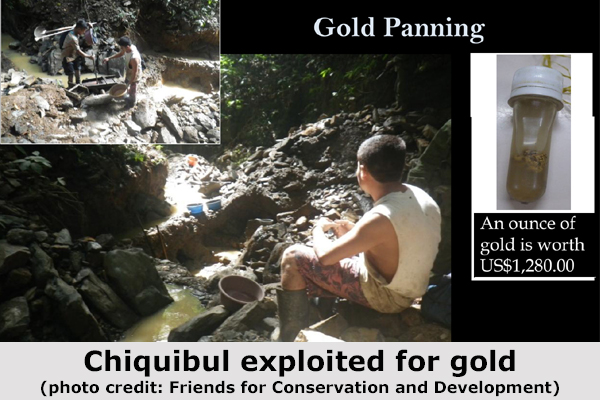“Guatemalan gold panners are more determined than ever to extract the rich resources of [Chiquibul/Maya Mountain] at all cost…”
Friends for Conservation and Development (FCD), the NGO which co-manages the Chiquibul National Park, estimates that at the moment, 100-150 Guatemalans, some of them armed, are engaged in illegal gold panning in the highlands of the Chiquibul/Maya Mountain area—and they continue to elude Belize security teams, thus posing a national security threat to the country.
“The threat of gold panning is high and so are the losses to our national patrimony. These areas are the true birth place of the Chiquibul River. Sedimentation, garbage and fecal contaminants are now found in areas where humans had never been operating before,” said Rafael Manzanero, FCD’s Executive Director.
Earlier this month, Manzanero went on patrol in the highlands of the Chiquibul/Maya Mountains (CMM) together with Joint Forces Unit personnel based at Ceibo Chico Conservation Post, and what they found was alarming.
“The environmental damage is high and we estimate that today this is the most critical issue to address in the Chiquibul Forest alongside the illegal logging,” Manzanero said. “However, unlike illegal logging, the gold panning activity is more difficult to address due to the remoteness and dangers associated in capturing the panners.”
FCD also notes that one vial with apparent gold residues was found on one camp, and several machetes and shovels found were disposed of on location and could not be brought due to the distance from camp.
No arrests were made, since it appears the gold panners have also planned schemes to elude Belizean authorities: “On three occasions contact was made with Guatemalan gold panners, but they made good their escape…. They whistle to alert those operating in the gullies and are astute in putting obstructions, such as branches and twigs that make noise as one approaches the area,” Manzanero points out.
Mining Inspector Michelle Alvarez told Amandala today that illegal gold panning is a huge concern, with reports by FCD of increased activities inside the Chiquibul.
Last July, the FCD featured a symposium, Alarming Threats to Biodiversity, Peace and National Stability, in an effort to highlight the urgent need for action in the Chiquibul. However, it is clear that since that event, no effective measure has been put in place to curb those threats. More than that, it is evident, based on FCD’s most recent report,that the threats have since multiplied.
Manzanero told Amandala that gold panners are moving further inland and more south, into more complex terrain, which has made it more difficult to contain, and all indications are that unless serious intervention is made, the problem will continue to worsen.
“Even our Guatemalan counterparts say we need to bolster our efforts, and if we don’t do it, it will be a bigger problem because the [gold panners] are becoming more determined,” Manzanero said.
He also notes that Guatemalans are coming from beyond the Petén to search for gold in Belize, and they travel from as far as Izabal and Alta Vera Paz, signaling that a multiplier effect is imminent unless the Government of Belize gets a firm grip of things.
He said that the problem is no longer just an environmental issue – but should be seen as a national territorial and security issue.
According to an official source, there is one company, Boiton Minerals Ltd., a locally owned company partnering with a foreign company – Erin Ventures, which has legal permission to prospect for gold inside the Chiquibul Forest Reserve.
Manzanero said that Belizean authorities have not been able to maintain the spirit of proactivity required to tackle the Chiquibul problem.
He notes that, “Guatemalan gold panners are more determined than ever to extract the rich resources of the CMM at all costs.”
Manzanero said that the gold panners are now located 6 hours away from the Ceibo Chico Conservation Post (more than 5 kilometers away from the conservation post), and are operating approximately some 12 kilometers (7.5 miles) away from the western border.
He added that, “The gold panners who are known to come from many areas of Guatemala, are apparently seeking to find better sources of gold on the highlands and are now practicing a different type of gold prospecting by opening trenches that can go as deep as 10-12 feet. These trenches are found nearby the streams.”
Manzanero again stresses the environmental risk these illegal operations now pose to Belize’s waterways which flow from the Chiquibul.
Unsightly refuse is also left behind by the gold panners. Manzanero notes that, “Garbage is prolific in the entire area with plastic bags, bottles, cans, old clothes, batteries, gloves and plastic pans used for panning the gold.”
Meanwhile, there continue to be concerns over unabated illegal logging by Guatemalans, and FCD notes that they are becoming more brazen in their operations.
In a joint security operation held just before the gold panning exercise, FCD rangers based at Tapir Camp reported that the Belize Defence Force escort had come across trees fallen on the Caracol Road. They found 14 timber trees cut, and some were merely 1.5 miles away from the main Caracol quarters.
FCD notes that since the Joint Forces have concentrated their effort in south Chiquibul, in an effort to combat illegal gold panning, additional patrols are required to operate in north Chiquibul, including the Caracol Complex and particularly to do night surveillance.
“From all observations, the loggers are determined individuals and feel rather safe to conduct their illicit activities so close to Caracol quarters. Their boldness to cut down the trees and let them drop on the highway should be of concern to all authorities, since loggers are not even concerned [about] concealing their illicit activities,” Manzanero notes.
He stresses that, “With appropriate planning and tactical interventions, as well as with [National Institute of Culture and History – NICH] personnel support, these illegal loggers can be detained and prosecuted.”

